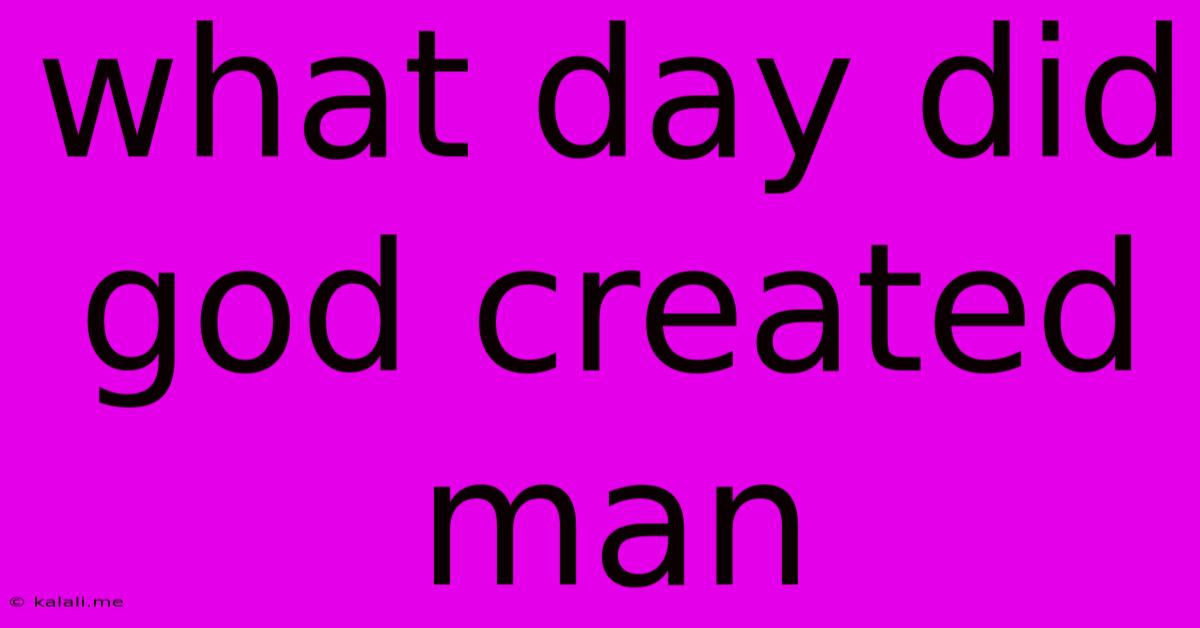What Day Did God Created Man
Kalali
Jun 04, 2025 · 3 min read

Table of Contents
What Day Did God Create Man? Unraveling the Genesis Narrative
The question of when God created man is a cornerstone of theological discussion and a frequent point of inquiry for those exploring the Book of Genesis. Understanding the answer requires careful consideration of the biblical text and acknowledging the diverse interpretations it has inspired. This article delves into the creation narrative in Genesis, exploring different perspectives and aiming to provide a nuanced understanding of this pivotal event.
A Closer Look at Genesis 1 and 2:
The creation account in Genesis is presented in two distinct but interconnected chapters. Genesis 1 offers a broader, more poetic overview of creation, outlining six days of creative acts culminating in the creation of humanity. Genesis 2, on the other hand, provides a more detailed and narrative-driven account, focusing specifically on the creation of Adam and Eve.
Genesis 1: A Summary of Creation Days:
- Day 1: God creates light and separates it from darkness.
- Day 2: God creates the sky and separates the waters.
- Day 3: God creates dry land, seas, and vegetation.
- Day 4: God creates the sun, moon, and stars.
- Day 5: God creates sea creatures and birds.
- Day 6: God creates land animals and, significantly, humanity. The text states, "Then God said, 'Let us make mankind in our image, in our likeness,'..." (Genesis 1:26).
According to this chapter, humanity is created on the sixth day. This is the most straightforward interpretation.
Genesis 2: A More Detailed Account:
Genesis 2 offers a more detailed narrative. God forms Adam from the dust of the ground and breathes life into him. Later, God creates Eve from Adam's rib. This account doesn't explicitly mention the number of days, focusing instead on the process and the relationship between God and humanity.
Reconciling the Two Accounts:
The seemingly different accounts in Genesis 1 and 2 have led to various interpretations. Some scholars suggest that Genesis 1 provides a framework or summary, while Genesis 2 focuses on the details of humanity's creation. Others see them as complementary perspectives, offering different but equally valid insights into the divine act of creation.
Interpreting the "Days" in Genesis:
It's important to note that the meaning of the "days" in Genesis is a matter of ongoing debate. Literal interpretations understand the days as 24-hour periods. However, other interpretations consider the "days" to represent longer periods, perhaps ages or epochs in Earth's history. This impacts the timeline but doesn't necessarily contradict the core message of God's creation of humanity.
The Significance of Humanity's Creation:
Regardless of the specific day, the creation of humanity holds profound significance in the Genesis narrative. Humans are created in God's image, reflecting a unique relationship and responsibility toward both God and the rest of creation. This bestows upon humanity a special place in God's plan, highlighting the importance of stewardship and ethical behavior.
Conclusion:
While Genesis 1 explicitly places the creation of humankind on the sixth day, the nuanced details and different perspectives within the biblical text itself encourage further exploration and reflection. Ultimately, the question of when God created man is less important than the why and how – the profound implications of being created in God's image and the responsibility that accompanies such a distinction. The enduring significance of this narrative lies not in a specific chronological detail, but in the timeless message of humanity's relationship with the divine.
Latest Posts
Latest Posts
-
Do Cats Need Their Nails Trimmed
Jun 05, 2025
-
Big Mosquito Looking Bug Not Crane Fly
Jun 05, 2025
-
400 Amp Meter Base With 2 200 Amp Disconnects
Jun 05, 2025
-
Briggs And Stratton Getting Too Much Fuel
Jun 05, 2025
-
What Does Wife To Boot Mean
Jun 05, 2025
Related Post
Thank you for visiting our website which covers about What Day Did God Created Man . We hope the information provided has been useful to you. Feel free to contact us if you have any questions or need further assistance. See you next time and don't miss to bookmark.